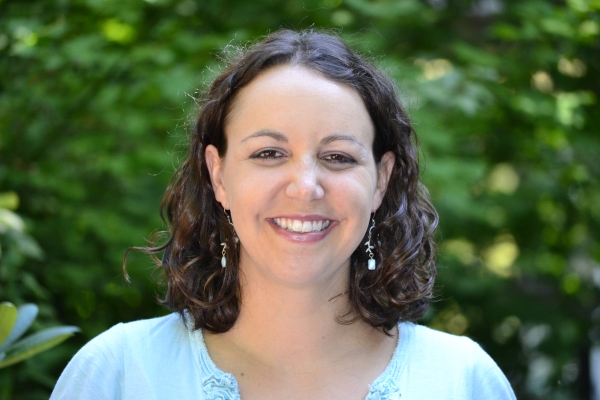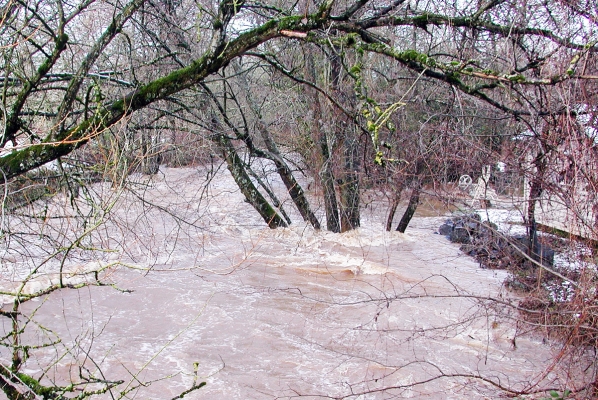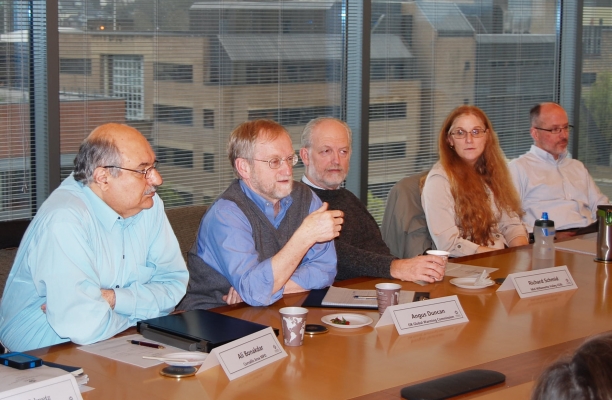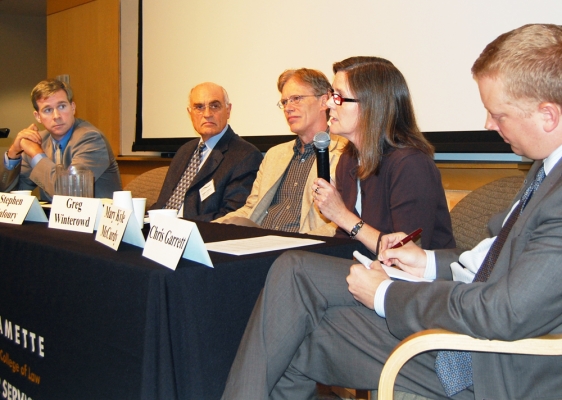States can reduce greenhouse gas emissions with a broad range of approaches, but none will have much luck without continued support from leaders and the public, according to NITC program research from the University of Oregon. In a conference paper for the annual meeting of the Transportation Research Board in Washington, D.C., a team led by Rebecca Lewis took a close look at the efforts West Coast states have made to reduce emissions from the transportation.
Cutting transportation emissions depends on three variables: vehicle efficiency, fuel carbon content and vehicle miles traveled, or VMT. The paper focuses on the last leg: cutting driving. While more efficient automobiles and alternative fuels have come on the market in recent years, a growing population and longer commutes can wipe out any emissions gains from shifts in fuel economy and fuel type.
Washington, Oregon and California have all passed statutes to cut statewide greenhouse gases below 1990 levels by 2020. The approaches vary in their targets, plans and strategies.
Lewis and her team present the research in a poster session Tuesday, Jan. 12 at the annual meeting of the Transportation Research Board in...
Note: This article is the first in a series on OTREC reports that examining the intersection of climate change and transportation. We’ll continue with articles on other topics, including a regionwide impact assessment of climate change effects on transportation and a narrow focus on the effects on public transit.
Of all effects of the climate on transportation, the most costly results from flooding in cities. Flooding disrupts urban life, causing expensive repairs, delays and hazards to address. In the Pacific Northwest, these effects are projected to worsen as human-caused global warming brings wetter weather and higher water tables.
Despite these projections, little research had focused on the effects of increased flooding on the transportation system and how those effects could be lessened. OTREC opened the door to this area of research with a project called Future Flooding Impacts on Transportation Infrastructure and Traffic Patterns Resulting from Climate Change. The final report is available to download here.
The project brought together scholars from Portland State University in the disciplines of geography, civil and environmental engineering, and urban studies and planning with officials from regional government Metro. The researchers also included regional stakeholders...
Read moreEven as complex visual representations of data become common, many people still don’t understand what land-use and transportation modelers do. In April, state and local planning directors met to address that and other issues they’ll increasingly face in the coming years. The Oregon Modeling Collaborative convened the Oregon Transportation Policy Forum for guidance in developing the tools agencies will need and to keep agencies talking about transportation issues.
Giving a complex topic such as global warming the video game treatment could make it easier to grasp, said Angus Duncan of the Oregon Global Warming Commission. “I have yearned for something that’s the greenhouse gas equivalent of a ‘Sim City,’ “ Duncan said at the forum. “Something simple enough that kids can play with it, but something you can use for communication.”
Developers have gotten much better at representing data, said Tom Schwetz, director of development services for Lane Transit District, but leaps in handheld devices such as iPhones have raised expectations still higher. Transportation models are getting more complex and, at the same time, people are demanding their information quicker and quicker.
Modelers struggle, Schwetz said, both because people don’t understand the complexity of the models and because modelers themselves don’t explain themselves clearly. The models then become easier to attack than to defend. “There is a credibility issue,” he said. “It’s too easy to...
Read moreA daylong conference Thursday in Salem focused on the ties between transportation and affordable housing. While not sponsored by OTREC, the conference dovetails with an OTREC theme, the intersection of land use and transportation.
Called "The Road Home: The Intersection of Transportation and Affordable Housing," the conference was sponsored by Housing Land Advocates, AARP and the Willamette University College of Law. Speakers tackled topics including transit-oriented development, land-use and transportation policies that spur the development of affordable housing, transportation agencies' civil rights obligations and climate change.
Although much of the discussion revolved around metro areas, one panel also addressed rural concerns. Sometimes simple solutions for small-town problems get overlooked, said panelist Travis Brouwer, senior federal affairs advisor with the Oregon Department of Transportation. Improving a local trail system can allow town residents to run errands without needing a personal vehicle, Brouwer said. Adding at least occasional bus service to the nearest large town can help residents go car-free, said Mary Kyle McCurdy, staff attorney for advocacy group 1000 Friends of Oregon.
The conference...
Read morePlease join the Portland State University Intelligent Transportation Lab and the Oregon Transportation Research and Education Consortium as we host a Transportation Research Board webinar on climate change mitigation and adaptation, followed by an informal discussion on climate change transportation impacts and planning in the Pacific Northwest. This webinar will explore the findings of Transportation Research Board Special Report 299: A Transportation Research Program for Mitigating and Adapting to Climate Change and Conserving Energy. Committee chair, Michael Meyer, will provide an overview of the research programs recommended by the committee that can be used to develop guidance to policy makers. When: Wednesday, December 2, 2009 Where: Portland State University Intelligent Transportation System Lab 1930 SW 4th Ave, Room 315 Time: 11 am - 12:45 pm
View background information (Press Release: Governor Praises State Employees for Exceeding Commuter Challenge Goal)
The video begins at 0:07.
Lewison Lem, Principal Consultant of Parsons Brinckerhoff, on reducing the climate impact of the transportation system.
View paper: Transportation Strategies to Mitigate Climate Change
View slides
The video begins at 1:49.
The video begins at 3:30.
Between aging infrastructure, climate change, peak oil, and livability concerns, the transportation profession faces significant challenges in the coming years. Meeting these challenges will require integrating the transportation profession in order to develop solutions and clearly articulate them to the public. This presentation will highlight the diverse roles within transportation, and the need for further interaction between them, using real-world examples.




